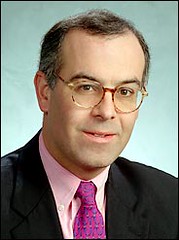The relative "truth" of David Brooks
I am no Lincoln scholar, but know just enough that his column this morning really bothered me. I intended to do a little fact-checking...well, not really...I'm too lazy and, anyway, Brooksie's columns are so light and vacuous that it quickly evaporated from whatever cortex our brains store such ravings.
In any case, Attaturk did it for me. And I'm grateful.
In full Bush Co. mode, Brooks tries this morning to turn Lincoln into the kind of God is My Kitchen Cabinet president that Dear Leader purports to be, regularly having wonky policy discussions with The Creator.
He writes,
That just didn't sound like the Lincoln I've read about. He may very well have seen freeing the slaves as Divine Providence, but he wasn't about to say he'd been tossing a coin with the Lord and it came up heads.
So, Brooks, prepare to be sliced open and your entrails examined.
Read on. Attaturk actually cites sources.
In any case, Attaturk did it for me. And I'm grateful.
In full Bush Co. mode, Brooks tries this morning to turn Lincoln into the kind of God is My Kitchen Cabinet president that Dear Leader purports to be, regularly having wonky policy discussions with The Creator.
He writes,
On Sept. 22, 1862, Abraham Lincoln gathered his cabinet to tell them he was going to issue the Emancipation Proclamation. He said he had made a solemn vow to the Almighty that if God gave him victory at Antietam, Lincoln would issue the decree.
Lincoln's colleagues were stunned. They were not used to his basing policy on promises made to the Lord. They asked him to repeat what he'd just said. Lincoln conceded that "this might seem strange," but "God had decided the question in favor of the slaves."
I like to think about this episode when I hear militant secularists argue that faith should be kept out of politics. Like Martin Luther King Jr. a century later, Lincoln seemed to understand that epochal decisions are rarely made in a secular frame of mind. When great leaders make daring leaps, they often feel themselves surrendering to Divine Providence, and their strength flows from their faith that they are acting in accordance with transcendent moral truth.
That just didn't sound like the Lincoln I've read about. He may very well have seen freeing the slaves as Divine Providence, but he wasn't about to say he'd been tossing a coin with the Lord and it came up heads.
So, Brooks, prepare to be sliced open and your entrails examined.
Lincoln had discussed the Emancipation Proclamation with his cabinet months before, beginning with a conversation with Secretary of State Seward and Secretary of the Navy Welles in mid-July 1862; they were stunned because until then Lincoln had opposed such a matter (apparently by Brooks logic "God" was telling Lincoln to keep slavery until then). Others, NOT GOD, had been encouraging Lincoln to issue a decree of emancipation for months, and he had been ruminating on the matter for a matter of weeks before this conversation.
Lincoln then discussed the matter with his entire cabinet a little over a month later telling them he intended to issue an emancipation proclamation. Some, such as Secretary of War Stanton and Attorney General Bates encouraged him to immediately issue it; Secretary of the Treasury Chase was reluctant to do so, the others were mixed, but it was Seward that suggested, to Lincoln's agreement, to wait to issue the proclamation until after a Union victory.
...So God decided to wait on emancipation apparently Davey.
[...]
On September 13, 1862, Lincoln actually met with a delegation of CHRISTIANS (even then President's had ... "daguerreotype ops"). That delegation actually encouraged Lincoln to issue an Emancipation Proclamation and Lincoln demurred.
Finally, on the day in question, Lincoln sat with his cabinet a few days after the tactical Union victory at Antietam (a bloody draw, but Lee withdrew so the Union held the field).
He did not SHOCK his colleagues with deciding to issue the proclamation.
He did not SHOCK his cabinet with any pronouncement of religious ferver, or any religious statement of the kind. The statement that Bobolicious refers to is at best dubious, and completely wrong in the context in which he provides it.
Read on. Attaturk actually cites sources.



0 Comments:
Post a Comment
<< Home